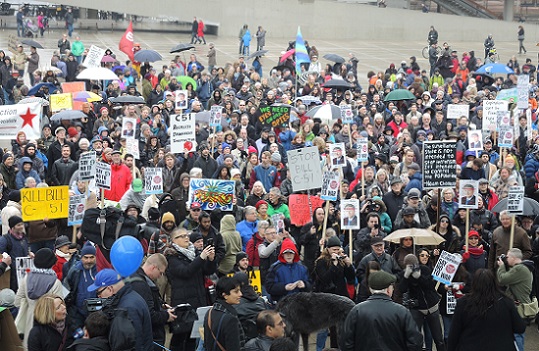Why do I connect the firing of Evan Solomon to the passage last night of Bill C-51? The link seems obvious. As Canada sinks ever more deeply into the mire of political and moral corruption, a lot of people are getting muddy.
Solomon is just the latest CBC national figure to get caught. There was Jian Ghomeshi and there was Amanda Lang. Ghomeshi had been up to his dirty tricks for a long, long time, until he rubbed the CBC brass’s collective nose in it, ensuring his swift exit. Lang remains on the job despite everything, and it took a Toronto Star investigation to stick it to Solomon. Internal accountability mechanisms? Non-operational. Since when have we seen three CBC rock stars caught out in a matter of months?
In this cautionary tale of a public corporation gone south, we can see in microcosm the effects of a poisoned political culture. A fish rots, as they say, from the head: and here we should look beyond the Harper-appointed CBC Board, to Harper himself. In a culture of near-impunity, those with power will naturally begin to believe they can get away with anything. Think Mike Duffy, with his blank pre-approved expense accounts. Think Bruce Carson, an ex-con granted access to the inner sanctum of the PMO. Think, in fact, of the veritable parade of cheap and not-so-cheap crooks and malfeasors who have taken long, shuddering sucks from the Conservative trough.
The Harper government has an almost pathological aversion to accountability. Witness the fate of various parliamentary watchdogs under its reign. And this year, the Conservatives introduced legislation to apply a political filter to their staff.
When it comes to oversight of the Canadian Security Intelligence Service (CSIS) in particular, Harper dissolved the office of the Inspector General of CSIS in 2012. The remaining “oversight” remains with the weak Security Intelligence Review Committee (SIRC), run at one point by a Conservative political hack now on the run for fraud. SIRC does not actually oversee CSIS, but reviews after the fact. Even so, CSIS has been notoriously uncooperative and less than candid with SIRC. And that was before the passage of C-51.
The Bill passed the House of Commons with the support of the Liberals, who got on board when it looked as though most Canadians supported it. But a chorus of reputable voices spoke out strongly against this dangerous piece of legislation, and over several months that support eroded precipitously, leaving the Liberals with a position justified neither by principle nor by their usual crass opportunism.
The Liberals in the Senate, as it turns out, were of a different breed, but the law passed anyway, and now we have a secret police with the power to override the Charter of Rights and Freedoms, and a populace any one of whom could be branded a “terrorist” for a whole range of activities. These might include civil disobedience (“changing or unduly influencing a government in Canada by force or unlawful means,” or “interference with critical infrastructure”), involvement in the BDS or Free Tibet movements, or support for the anti-Assad forces in Syria (“an activity that takes place in Canada and undermines the security of another state”), or even speaking up for freedom fighters wherever they are laying down their lives to take down a repressive government (“communicating statements knowingly advocating or promoting the commission of terrorism offences in general”).
“Terrorism offences” are set out in section 83.01 of the Criminal Code. They include an act or omission committed “in whole or in part for a political, religious or ideological purpose, objective or cause” with “the intention of intimidating the public, or a segment of the public, with regard to its security, including its economic security, and which causes a serious risk to the health or safety of the public or any segment of the public.” [emphases added]
We’re meant to be reassured by a clause in 83.01 about disrupting essential services that supposedly exempts “advocacy, protest, dissent or stoppage of work,” but these are trumped by the “serious risk to the health or safety of the public” clause. (The language of C-51, oddly enough, leaves out “stoppage of work,” restricting itself to “advocacy, protest, dissent and artistic expression.”)
Assembling the pieces here, a perfectly lawful public service strike could be deemed “terrorist,” not to mention wildcat strikes in any of a number of industrial and service sectors, public and private. After all, who decides if the health or safety of the public or a segment thereof is indeed threatened? When does “advocacy” become “promoting the commission of terrorism offences in general”? And when is “protest” (think pipelines or Idle No More) transformed into “intimidating…a sector of the public”?
There are too many examples of Harper’s incessant abuses of power to be enumerated here, but C-51 is a special case. The appalling reach of the Bill summoned forth an opposition that consists, not only of the usual suspects on the Left, but of sober centrists and a gaggle of right-wingers as well. Our collective efforts, I think it is fair to say, brought the Canadian public around.
Assuming no further deformation of the electoral process — I’m looking at you, Skippy, and the inner-circle Conservative pranksters who steered voters away from their polling stations in 2011 — the opinion polls tell us we have a shot at putting an end to the Harperium this fall. But it’s not going to be slam-dunk easy — these folks aren’t going down without a fight, and that fight will be filthy dirty. In the meantime, the stain of political corruption continues to spread. Expect more lurid tales of malfeasance over the next few months, as the antinomian values of this government further permeate our public institutions.




